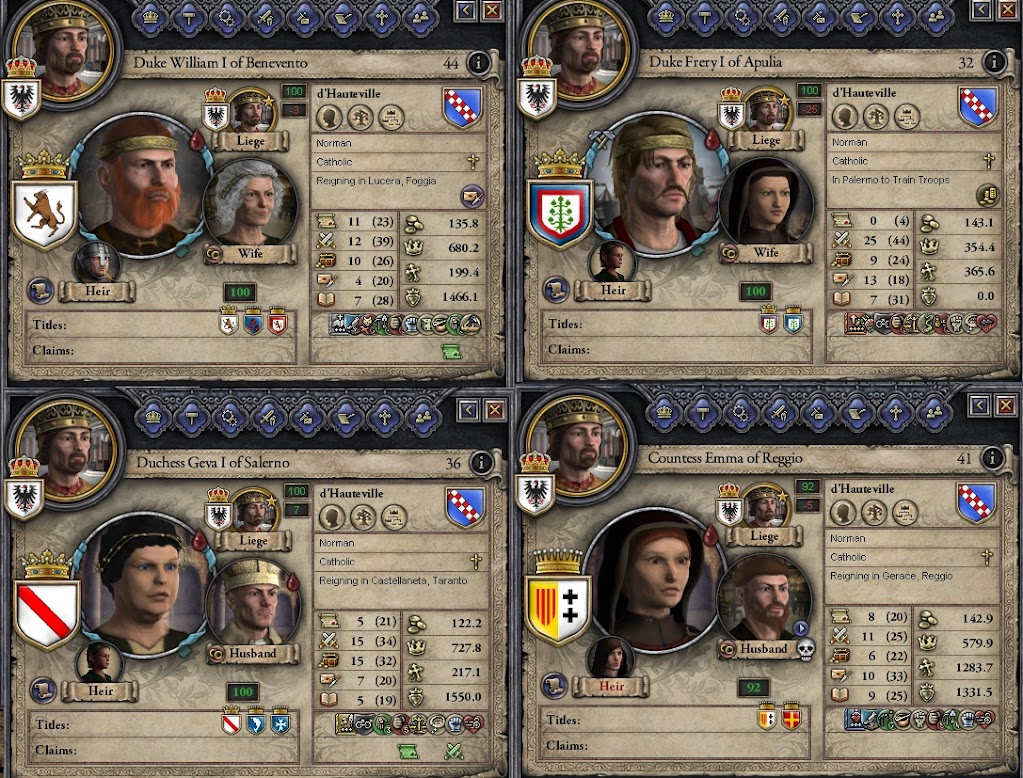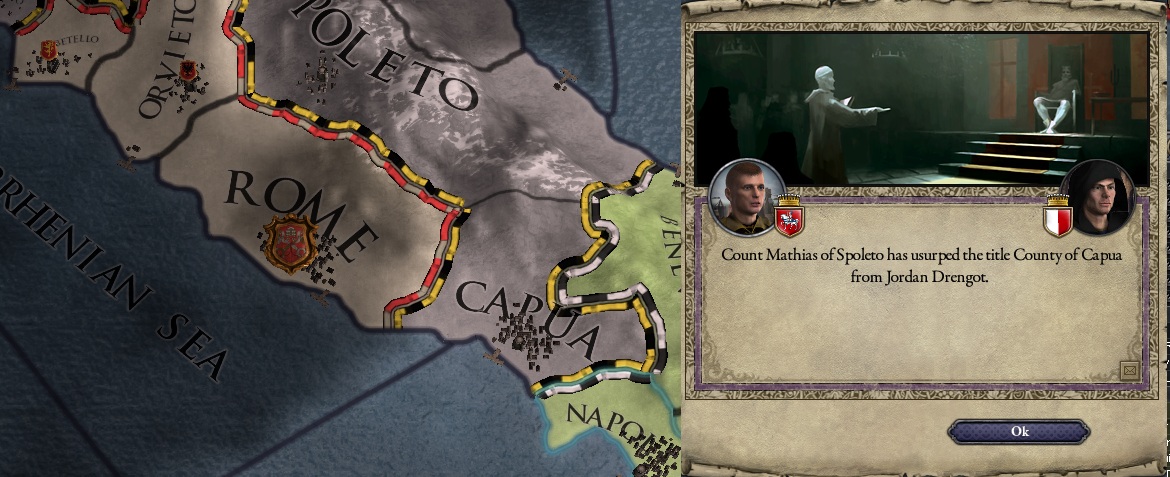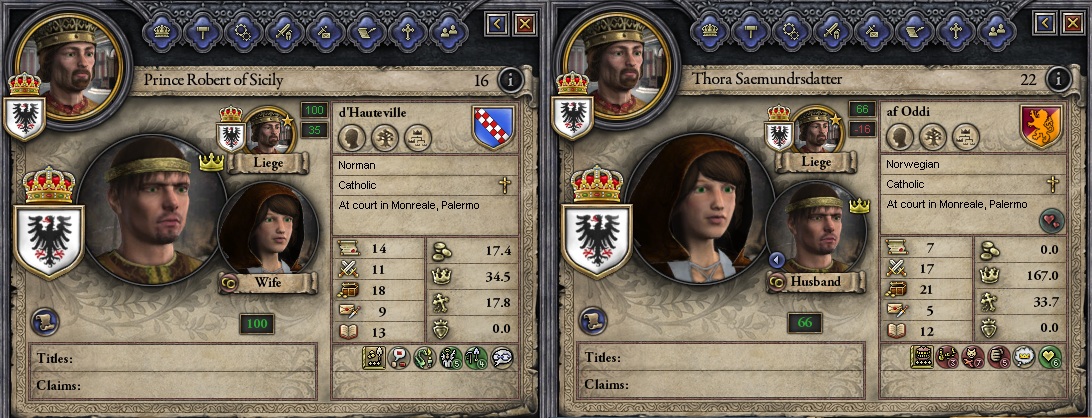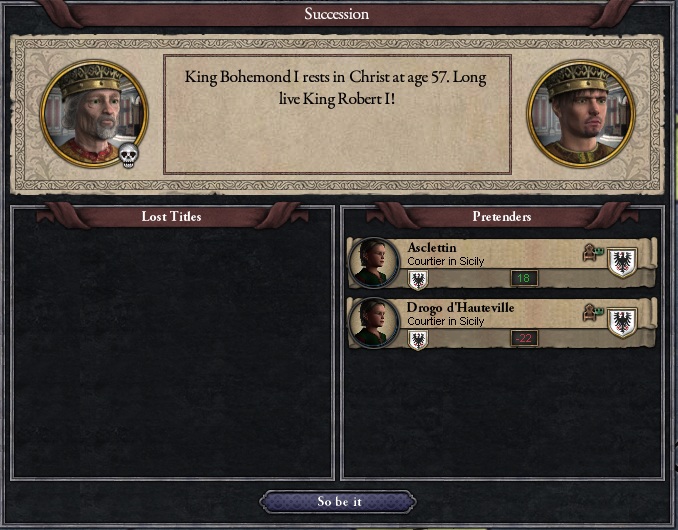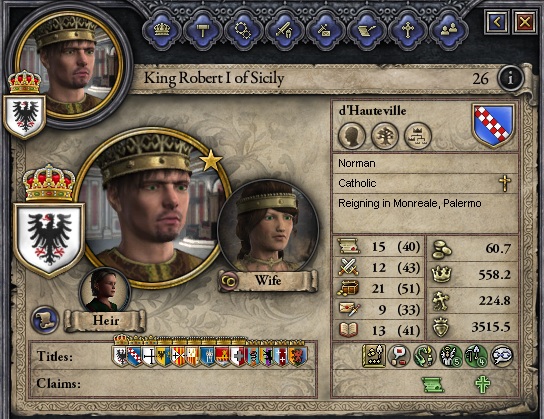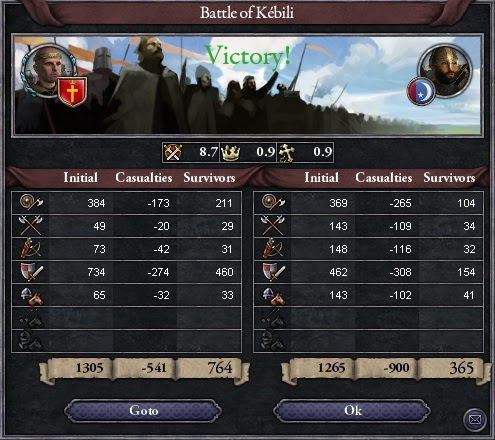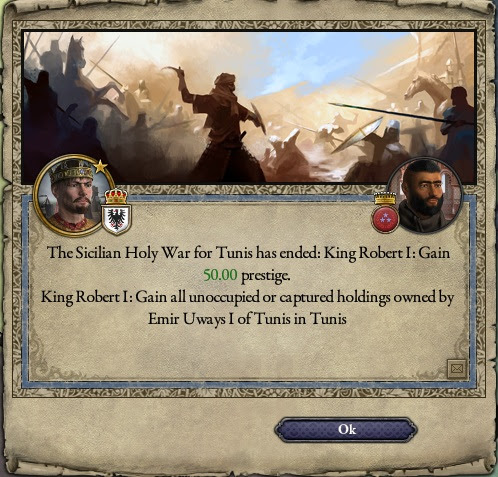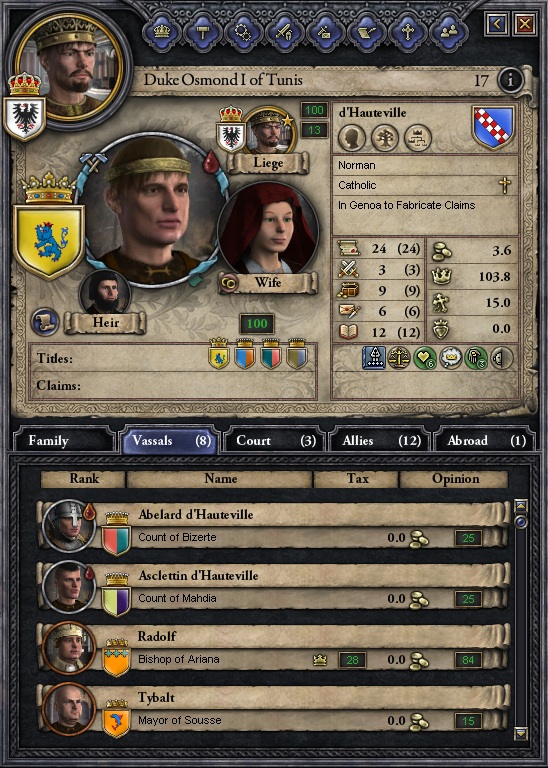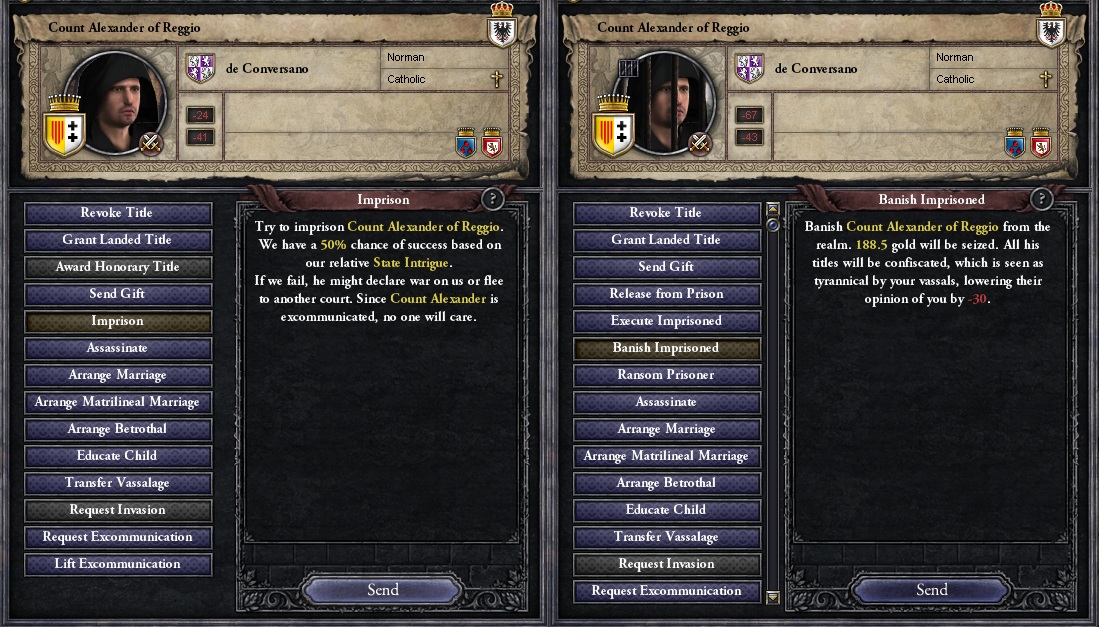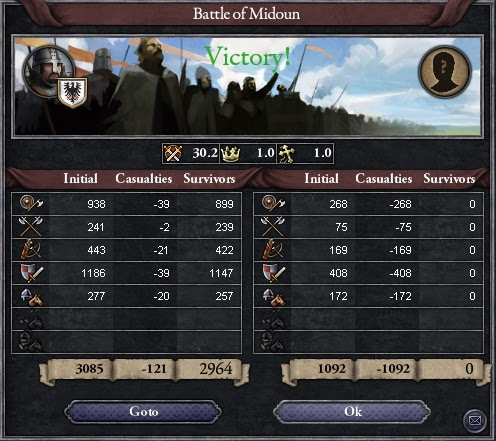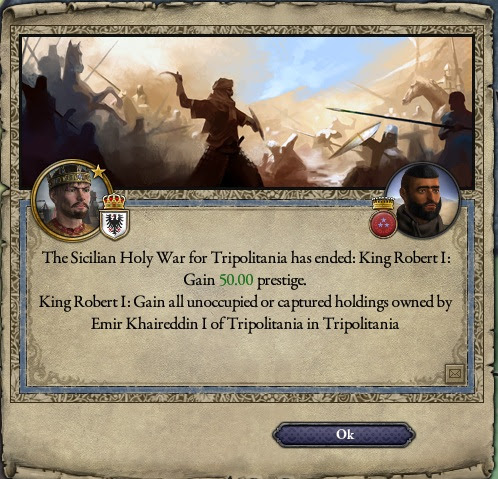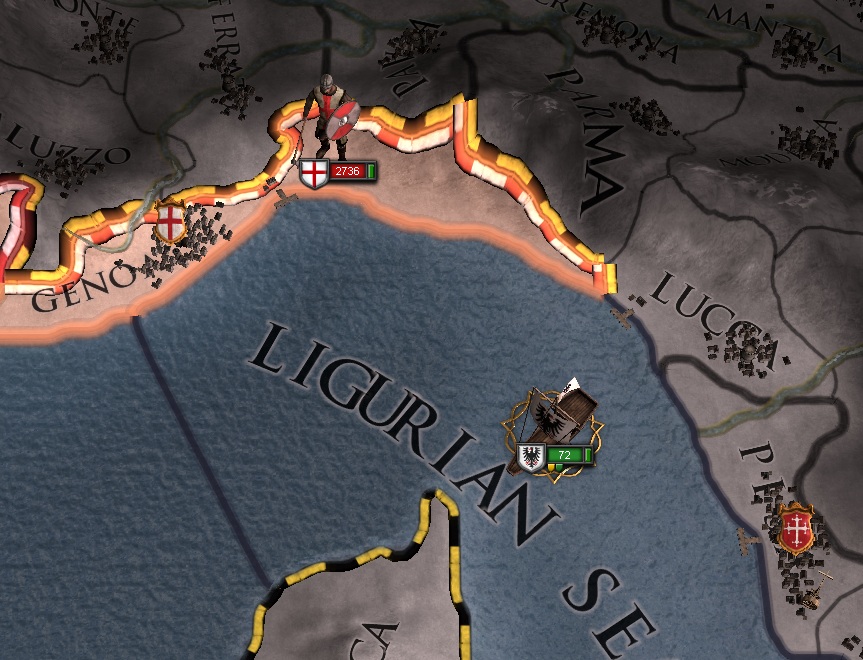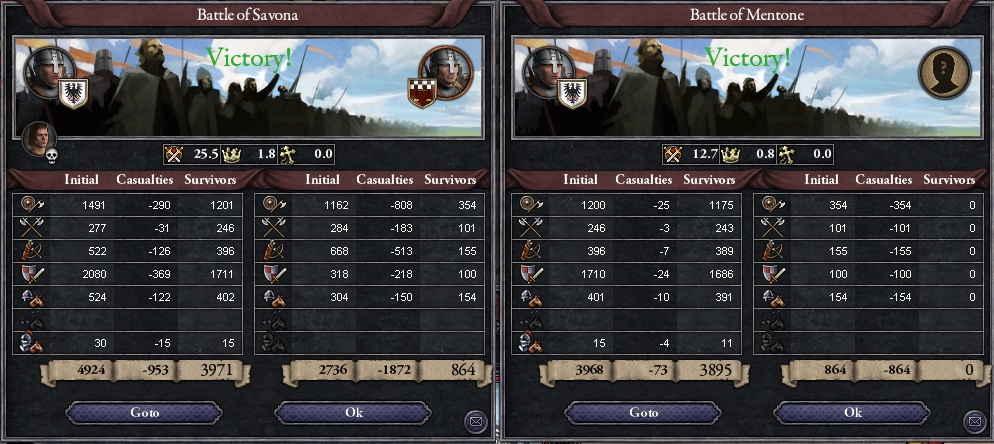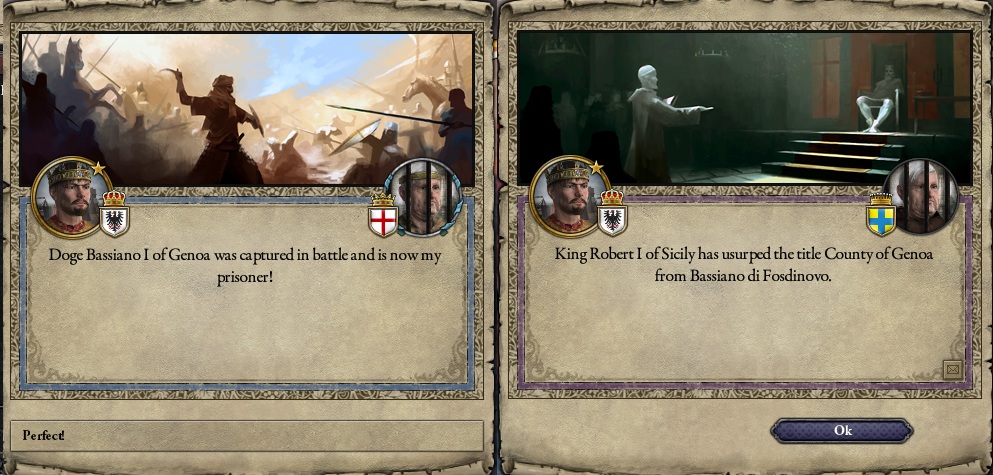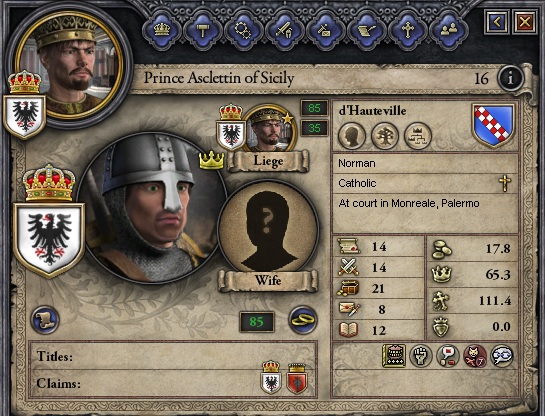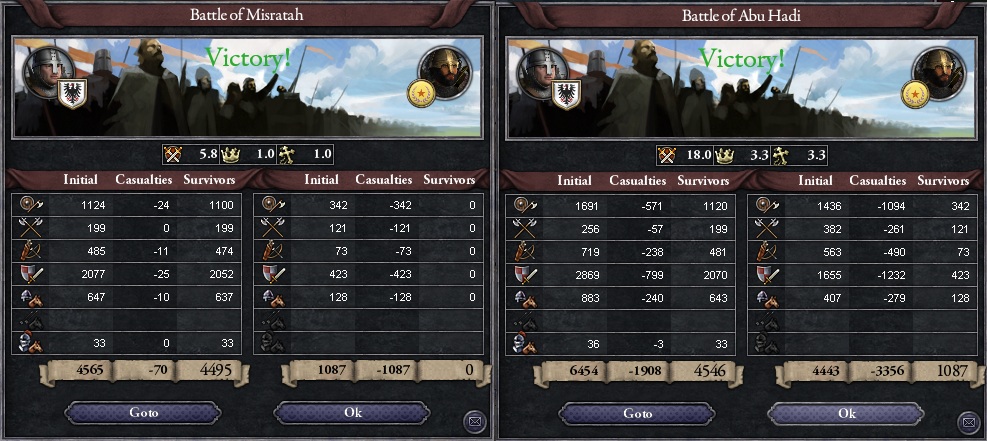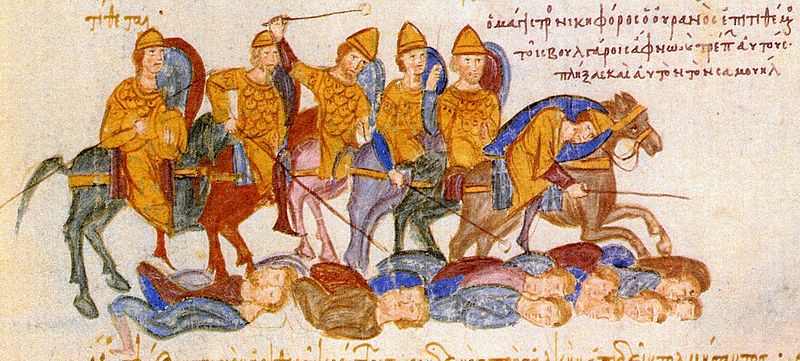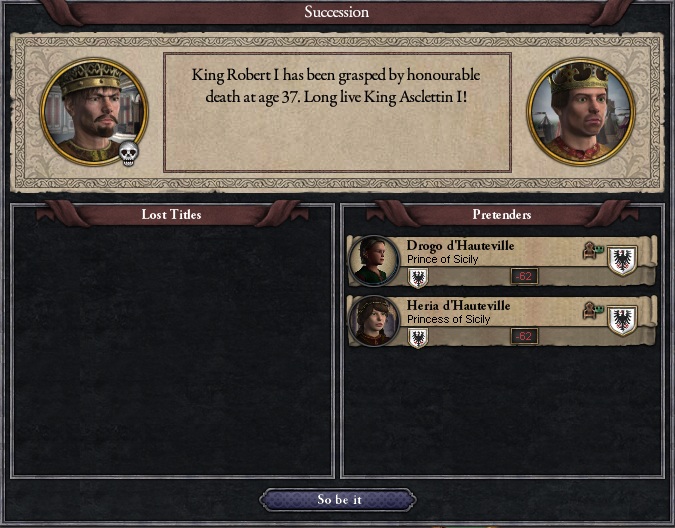Interlude-The Coronation of King Bohemond I
The Pope
Pope Severinus II was not happy. The winter seas in Mediterranean were rough, the food tasted awful (and after meeting with Pope’s innards, had decided that this is not what they were looking for and went back up) and the cabin was too small. Yet, he had decided to take the boat, for the rumors of robber bands and rebels roaming in the Napolian area made the voyage over the sea the safer route. Not the most comfortable though.
Still, Severinus felt relief when the city of Palermo finally came to view. The high towers of churches, the city walls- and as the ship sailed closer- the luxurious houses, promising the poor Pope a chance to rest after the journey.
As the ship sailed closer, showing Papal colours, the city burst to life. You could see people running around, making the panic spread. And out of panic and chaos, some order forcing itself in. When the ship pulled up to dock and Severinus II walked to ground, the city council was already waiting for him. Humble and polite, they escorted Pope into his residence, built in Arab style. The luxuries of the house made the Papal residence in Rome pale in comparison.
When arriving, Pope sent his escort away. He looked around the house, finally settling to walking nervously back and forth in front of a beautiful fountain in inner courtyard. He did not like it. Well, he quite liked the fountain, but didn’t like the situation he was in. Holy Roman Empire to the North, still strong. Still capable of bringing huge armies to the field when needed be. And the fight for authority between the Emperor and the Pope- always on, always eating nerves.
Just a few decades ago, at least South of Papal States was low-threat. No more Byzantium to threaten Papal authority, Arabs were a threat, but not by much. Local lords squabbling with each other. All has changed with arrival of these Norman opportunists. They have created a strong state, they control the Southern Italy under unified banner. And they show no signs of planning to leave. Silvester sighed again. If things turn out well, Normans and Sicily go like rabid dogs at each other’s throats over holdings in Italy- but it’s likely that whoever wins will come out stronger and press the Pope even more.
Silvester knew that there was nothing he could do about it. His arrival in Palermo, more or less forced- after all, how can the Pope refuse Duke Bohemond, the Conqueror of Heathens, Defender of Italy and so on and so on when the Duke so humbly asks of him for one minor thing- that the Pope himself would bless him and his house by leading the ceremony of crowning Bohemond as the King of Sicily. Granting the future King more prestige- but also showing the Papal authority, for it is Silvester who, in the name of God, shall put a crown in King’s head, thus showing the supreme authority of the Church in such divine matters at the coronation of Kings.
Silvester decided not to worry anymore. The coronation was a week ago- enough to rest after the journey and find some food that actually stays inside.
The Duke, a week later
The procession was moving slowly. Bohemond was riding his finest horse, wearing his finest clothes, covered with gold and jewels. He looked absolutely stunning there. And felt even better. It is good to be a Duke, but even better to be a King, he said to himself, grinning widely.
It has been about two hours when the procession started. First, the priests, walking slowly, chanting prayers. Then the higher hierarchy of church- abbots, bishops and such. Followed by the Pope and his retinue. Then the soldiers- battle-hardened Normans in their military outfits, swords and shields gleaming in the sun. Finally, the Duke himself, surrounded by his vassals and loyal courtiers.
The citizens of Palermo (and of course other subject who had came to see the coronation, plus the usual amount of thieves, hookers, robbers and other lowlifes who wouldn’t miss the show for the world) did what they were expected to do- cheered, screamed the name of Bohemond and were generally happy.
The sounds were deafening, the sun was burning hot and the procession had taken a wee bit too long when they finally reached the Cathedral. All who were someone were already in, waiting for Bohemond to walk to the altar. He moved slowly, thankful that most of the noises were left behind the Cathedral doors and the burning sun had been replaced with coldness of the church.
As the Duke reached the Altar, he kneeled, the ceremony started. It was long, winding, boring and it made Bohemond a ruled anointed by God himself and blessed by the Pope.
He entered the cathedral as Duke and came out as a King. And there was much cheering and celebrating and drinking an feasting.
Bohemond smiled. Grandson of a minor noble in Normandy. Bastard son of a mercenary. King Bohemond I.

The Coronation of Bohemond I
The Pope
Pope Severinus II was not happy. The winter seas in Mediterranean were rough, the food tasted awful (and after meeting with Pope’s innards, had decided that this is not what they were looking for and went back up) and the cabin was too small. Yet, he had decided to take the boat, for the rumors of robber bands and rebels roaming in the Napolian area made the voyage over the sea the safer route. Not the most comfortable though.
Still, Severinus felt relief when the city of Palermo finally came to view. The high towers of churches, the city walls- and as the ship sailed closer- the luxurious houses, promising the poor Pope a chance to rest after the journey.
As the ship sailed closer, showing Papal colours, the city burst to life. You could see people running around, making the panic spread. And out of panic and chaos, some order forcing itself in. When the ship pulled up to dock and Severinus II walked to ground, the city council was already waiting for him. Humble and polite, they escorted Pope into his residence, built in Arab style. The luxuries of the house made the Papal residence in Rome pale in comparison.
When arriving, Pope sent his escort away. He looked around the house, finally settling to walking nervously back and forth in front of a beautiful fountain in inner courtyard. He did not like it. Well, he quite liked the fountain, but didn’t like the situation he was in. Holy Roman Empire to the North, still strong. Still capable of bringing huge armies to the field when needed be. And the fight for authority between the Emperor and the Pope- always on, always eating nerves.
Just a few decades ago, at least South of Papal States was low-threat. No more Byzantium to threaten Papal authority, Arabs were a threat, but not by much. Local lords squabbling with each other. All has changed with arrival of these Norman opportunists. They have created a strong state, they control the Southern Italy under unified banner. And they show no signs of planning to leave. Silvester sighed again. If things turn out well, Normans and Sicily go like rabid dogs at each other’s throats over holdings in Italy- but it’s likely that whoever wins will come out stronger and press the Pope even more.
Silvester knew that there was nothing he could do about it. His arrival in Palermo, more or less forced- after all, how can the Pope refuse Duke Bohemond, the Conqueror of Heathens, Defender of Italy and so on and so on when the Duke so humbly asks of him for one minor thing- that the Pope himself would bless him and his house by leading the ceremony of crowning Bohemond as the King of Sicily. Granting the future King more prestige- but also showing the Papal authority, for it is Silvester who, in the name of God, shall put a crown in King’s head, thus showing the supreme authority of the Church in such divine matters at the coronation of Kings.
Silvester decided not to worry anymore. The coronation was a week ago- enough to rest after the journey and find some food that actually stays inside.
The Duke, a week later
The procession was moving slowly. Bohemond was riding his finest horse, wearing his finest clothes, covered with gold and jewels. He looked absolutely stunning there. And felt even better. It is good to be a Duke, but even better to be a King, he said to himself, grinning widely.
It has been about two hours when the procession started. First, the priests, walking slowly, chanting prayers. Then the higher hierarchy of church- abbots, bishops and such. Followed by the Pope and his retinue. Then the soldiers- battle-hardened Normans in their military outfits, swords and shields gleaming in the sun. Finally, the Duke himself, surrounded by his vassals and loyal courtiers.
The citizens of Palermo (and of course other subject who had came to see the coronation, plus the usual amount of thieves, hookers, robbers and other lowlifes who wouldn’t miss the show for the world) did what they were expected to do- cheered, screamed the name of Bohemond and were generally happy.
The sounds were deafening, the sun was burning hot and the procession had taken a wee bit too long when they finally reached the Cathedral. All who were someone were already in, waiting for Bohemond to walk to the altar. He moved slowly, thankful that most of the noises were left behind the Cathedral doors and the burning sun had been replaced with coldness of the church.
As the Duke reached the Altar, he kneeled, the ceremony started. It was long, winding, boring and it made Bohemond a ruled anointed by God himself and blessed by the Pope.
He entered the cathedral as Duke and came out as a King. And there was much cheering and celebrating and drinking an feasting.
Bohemond smiled. Grandson of a minor noble in Normandy. Bastard son of a mercenary. King Bohemond I.

The Coronation of Bohemond I



